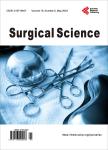The Use of Positron Emission Tomography in the Diagnosis of Prosthetic Arteriovenous Hemodialysis Graft Infection: A Case Study
作者机构:Department of Vascular SurgeryUniversity HospitalToulouseFrance Department of Vascular SurgeryCentre Hospitalier Universitaire Vaudois(CHUV)University HospitalLausanneSwitzerland
出 版 物:《Surgical Science》 (外科学(英文))
年 卷 期:2014年第5卷第2期
页 面:70-73页
学科分类:1002[医学-临床医学] 100214[医学-肿瘤学] 10[医学]
主 题:Hemodialysis Access Graft Infection PET-CT
摘 要:Patients on chronic hemodialysis (HD) required efficient arterio-venous access. Different types of vascular access are commonly used, such as native arteriovenous (AV) fistula, prosthetic AV graft, central venous catheter, or temporary and tunnelled cuffed catheters. Vascular access—related morbidity remains the major issue for patients requiring long-term therapy. Vascular access infection constitutes the most challenging and life-threatening complication of vascular access and causes significant morbidity, loss of access and mortality. Vascular access infection is defined as local signs at the vascular access site or a positive blood culture with no know source other than the vascular access. The critical issue in the management of AV graft infection is the need to remove the infection and to maintain HD access with reduced morbidity. The diagnosis of infected AV graft is not always easy, especially with low-grade infection or atypical presentation. Fluorodeoxyglucose positron emission tomography (FDG-PET) is an imaging method that uses a radioactively labelled tracer (18 fluorodeoxy glucose) which is taken up by tissue with high metabolic activity, such as neoplastic and inflammatory lesions. FDG-PET has been proposed to visualise localisation of infection in patients with suspected prosthetic graft infection. We report a case of methicilin resistant staphylococcus aureus (MRSA) hemodialysis access infection without local inflammatory signs diagnosed on the PET-CT.



